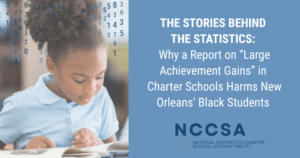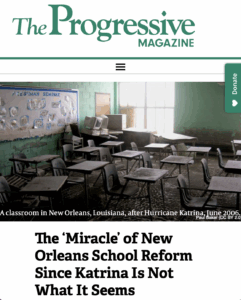
FOR THE 20-YEAR MEMORIAL OF HURRICANE KATRINA, Tulane University’s Education Research Alliance (ERA) for New Orleans widely disseminated a policy brief enti- tled The New Orleans Post-Katrina School Reforms: 20 Years of Lessons, which lauded “large gains in achievement” in the city’s all-charter school district. That brief was widely picked up in the press as the definitive evaluation of the city’s charter reform.
If read in isolation, the ERA brief presents a rosy picture of post-Katrina schools. However, the truth is far more complicated. The counter-narratives based on the research of other scholars tell a story that contradicts the Research Alliance’ findings and present not only factors that were not considered by ERA but also negative effects of the reform.
Recently, the National Center of Charter School Accountability asked scholar Kristen Buras, Ph.D. to critique ERA’s latest brief and include her own findings.

You can read that important brief here. Buras concludes that “New Orleans stands as a warning — not a model”. She warns that “a system that prizes statistical measures over the flourishing of our youth is not promising; it is destructive.”

NPE Executive Director, Carol Burris, Ed.D. debunked other ERA claims here in an article in The Progressive. She noted that “Between 2015 and 2023, academic improvements plateaued.” And asked, “If charter churn and the replacement of failing schools with better schools is the secret sauce of success, then why haven’t test scores continued to rise even as churn has increased?”
Bruce Baker, Ph.D. wrote an extensive critique of previous ERA finding, noting that not only were the returning students different from those who attending public schools before the storm, a huge influx of philanthropic money was available to the charter schools dramatically boosting their income and spending. You can read his report, What Should We Really Learn From New Orleans After the Storm? here.
Finally, we urge those with interest in the NOLA charter reforms to read a 2015 study by the Stanford Center for Opportunity Policy in Education (SCOPE) that the concluded that the “constantly changing metrics,” which included “changes in both [test standards] and content,” resulted in different conclusions regarding the efficacy of reform. SCOPE counseled that New Orleans-style school reform is not a model that should be replicated. Finally, Bruce Sacerdote, Professor of Economics at Dartmouth College, found in a 2012 paper that student evacuees who left the city permanently had higher test scores than those who returned to the chartered system.
The counter-narratives of Buras, Burris, Baker, SCOPE, and Sacerdote are more compelling in light of what has occurred since that first decade after Hurricane Katrina.
Since its publication in July, a policy brief on New Orleans schools has attracted a great deal of attention from journalists, charter school supporters, and skeptics of the post-Katrina reforms.
However, it remains unsettled whether the frequent school closures within the charter school system, known as “charter churn,” is truly the cause of the increase in test scores. Scholar Bruce Baker argued that a “significant reduction in concentrated poverty,” along with a dramatic increase in spending, were in fact the drivers of test score improvement. A 2015 study by the Stanford Center for Opportunity Policy in Education (SCOPE) concluded that the “constantly changing metrics,” which included “changes in both [test standards] and content,” resulted in different conclusions regarding the efficacy of reform. Noting that New Orleans was “one of the lowest-performing districts in one of the lowest-performing states in the United States,” the SCOPE study also concluded that New Orleans-style school reform, as it exists now, is not a model that should be replicated. Bruce Sacerdote, Professor of Economics at Dartmouth College, found in a 2012 paper that student evacuees who left the city permanently had higher test scores than those who returned to the chartered system.
